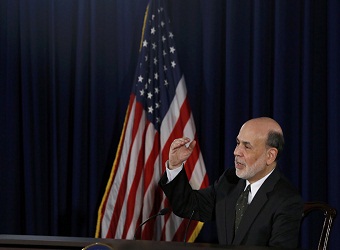Investors sell both stocks and bonds after Bernanke cites strengthening economy as reason for winding down programme.
Ben Bernanke, chairman of the US Federal Reserve, has said the central bank is likely to slow its bond-buying programme this year and end it by next year because of a strengthening economy. The announcement on Wednesday implies that a reduction in the Federal Reserve’s $85bn-a-month programme would probably mean higher rates on mortagages and other consumer and business loans.
After a two-day policy meeting, the Fed upgraded its outlook for unemployment and economic growth. In a statement, the Fed said the “downside risks to the outlook” had diminished since autumn Fed members voted to continue the pace of its bond-buying programme for now.
Later, Bernanke said the Fed would slow its bond buying later this year as long as the economy sustained its improvement. He said the pullback in purchases would occur in “measured steps” and could end by the middle of 2014. By then, he thinks unemployment will be around seven percent.
The statement made no mention of scaling back on bond purchases but Bernanke said he had been “deputised” to clarify the Fed’s policy and how it might vary depending on the economy’s health. Even after the Fed ends its bond purchases, it will continue to maintain its vast investment portfolio, which will help keep long-term rates down, Bernanke said.Anticipating higher rates, investors reacted on Wednesday by selling both stocks and bonds.
Investors have been selling bonds and driving up yields since last month after vague signals from the Fed that higher long-term rates might be coming. The ultra-low borrowing rates the Fed has engineered have been credited with helping spur a housing revival, support economic growth, drive stocks to record highs and restore the wealth which the US lost to the recession.
Bernanke suggested that increased home prices and household wealth, a stronger construction industry and steady consumer spending would help support economic growth and offset higher mortgage rates. “Generally speaking, financial conditions are improving,” he said.
The Fed’s more upbeat forecast helps explain why it thinks record-low rates may soon no longer be necessary. Low rates help feed economic growth. But they also raise the risk of high inflation and dangerous bubbles in assets like stocks or real estate.
In its statement, the Fed also said it would maintain its plan to keep short-term rates at record lows at least until unemployment reaches 6.5 percent. In its updated economic forecast, Fed officials predicted that unemployment will fall to 7.2 percent or 7.3 percent at the end of this year from the current 7.6 percent.
The Fed also said inflation was running below its two percent long-run objective, but noted that temporary factors were partly the reason. It said inflation could run as low as 0.8 percent this year. But it predicts it will pick up next year to between 1.4 percent and two percent.
Source: Aljazeera


